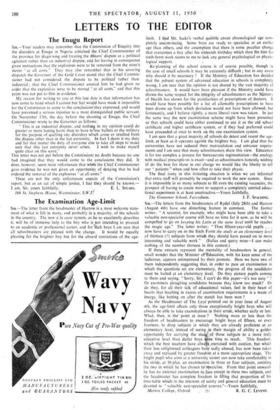The Examination Age-Limit
S1R,—The letter from the headmaster of Harrow is a most welcome state- ment of what is felt in many, and probably in a majority, of the schools in the country. The new a la carte system, as be so excellently describes it, will be of immense help to the boy who is -not intending to proceed to an academic or professional career, and foritch boys 1 am sure that
all schoolmasters are pleased with the change. It would be equally pleasing for the brighter boy but for the absurd restrictions of the age-
limit. I find Mr. Jacks's verbal quibble about chronological age com- pletely unconvincing. Some boys are ready to specialise at an earlier age than others, and the assumption that there is some peculiar change that overcomes a boy after his sixteenth birthday which then- fits him for sixth-form work seems to me to lack any general psychological or physio-
logical support. 4, Re-planning of the school course is of course possible, though in the case of small schools it may be extremely difficult ; but in any event why should it be necessary ? if the Ministry of Education has decided that the present system of advanced education in schools is completely wrong, I am sure that the opinion is not shared by the vast majority of schoolmasters. It would have been pleasant if the Ministry could have shown the same respect for the iptegrity of schoolmasters as the Mjnistry of Health has shown for the peculiarities of prescriptions of doctors. It would have been possible for a list of allowable prescriptions to have been drawn up from which deviation would not have been allowed, but fortunately, and I believe rightly, a more liberal view was taken. In just the same way the new examination scheme might have been presented so that schools could have either continued to use it as the old school certificate and higher certificate system, or if they had preferred could have proceeded at once to work op the one examination system.
I am sure that a great majority of schools do detest and resent the age- limit, at least as it operates against the brighter boy. I am glad that the universities have not reduced their matriculation and entrance require- ments and I am sure that many schoolmasters share this view. Education is far too complex a process for bureaucratic regimentation—the analogy with medical prescriptions is exact—and as schoolmasters honestly wishing to do the best for those in our charge we would like the liberty to tell our " patients" when and how often to take their physic.
The final irony in this irritating situation is when we are informed that extra staff will prooably be required to work the new system. Since it is impossible in so many subjects to fill even the existing vacancies, the prospect of having to create more to support a completely untried educa- tional experiment is at least unattractive.—Yours faithfully,
The Grammar School, Faversham. J. F. SPALDING.


































 Previous page
Previous page